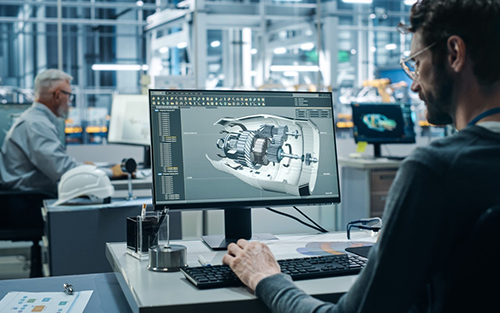- By Dr. Matthias Loskyll
- July 02, 2025
- Siemens
- Feature
- Sponsored
Summary
Embedding AI systems into products makes AI accessible and usable for a wide range of users.

According to a study by the World Economic Forum, more than 70% of industrial AI projects are abandoned after the pilot phase. While some companies successfully integrate artificial intelligence (AI) into their operations and achieve significant economic benefits, others face major challenges. However, many examples show that AI can be effectively used in manufacturing and has become a vital element of flexible, efficient production (Figure 1). Today, AI solutions are available that not only integrate smoothly into industrial processes but can also handle complex tasks with high efficiency.

Visual quality control
Quality assurance is a key task in industrial manufacturing. AI-powered image processing systems now make reliable quality inspections possible. One example is Inspekto, a solution for visual quality inspection that enables companies to automate product checks without needing deep AI or image-processing knowledge. The intuitive system can be ready for use in less than an hour and needs only about twenty sample images classified as “good” to deliver accurate results. Basic production knowledge of quality testing is enough—no AI expertise is required (Figure 2).
For example, the mid-sized company MTConnectivity Power2pcb uses Inspekto to inspect connectors to identify minimal deviations and slightly bent contacts. By integrating this AI-based system into its production line, the company ensures continuous quality assurance, improves reliability and shortens delivery times.

Generative AI in manufacturing
The application and implementation of generative AI models are more complex. Siemens’ Industrial Copilots are designed to improve human-machine collaboration and accelerate innovation across the entire value chain—from design, planning and engineering to operations and service. The Industrial Copilot for Operations is currently being piloted at customer sites and Siemens factories to test its reliability. Meanwhile, the Industrial Copilot for Engineering is already available as a finished product (Figure 3).
Thyssenkrupp Automation Engineering, a specialized machinery and equipment manufacturer, has integrated the Siemens Industrial Copilot into its systems for handling round cells used in battery inspections for electric vehicles. The Copilot automates repetitive tasks like data management, sensor configuration and detailed reporting that helps meet strict battery inspection standards. By managing routine tasks, the Copilot allows engineering teams to focus on complex, high-value activities, while solving problems in real time, minimizing downtime and ensuring smooth production.

Predictive maintenance with AI
AI is also revolutionizing predictive maintenance. Instead of relying on fixed maintenance intervals or manual analysis, AI uses continuous machine data monitoring to detect early signs of wear and suggest maintenance actions. Siemens’ Senseye Predictive Maintenance solution identifies deviations in temperature, vibration and torque data to offer early warnings and recommendations (Figure 4).
Mercer Celgar, a producer of pulp and wood products, uses this technology to monitor its machinery in real time. Data from multiple production lines is combined into a central platform that provides a full overview of the manufacturing process and significantly reduces downtime.

Seamless integration of AI models
Even companies that have already adopted AI face challenges when scaling their solutions. Issues like time-consuming updates, poor connectivity or complex maintenance often arise. To address these challenges, the Industrial AI Suite is available. Industrial AI Suite is a platform for the smooth implementation of AI solutions on the shop floor.
These solutions are customized in close collaboration with customers to combine their existing AI expertise with Siemens’ infrastructure for scalable deployment . Depending on the use case, these solutions use edge or cloud computing to integrate services like AWS or Microsoft Azure. AI models can be trained in the cloud and then easily deployed to production floors using the AI Inference Server. The Industrial Edge application enables customers to deploy and run trained AI models in production, directly on the Industrial Edge, even with GPU-accelerated inferencing.
The Industrial AI Suite also manages the full AI model lifecycle, which allows easy updates and automatic detection of performance issues. For example, Siemens helped a food and beverage company integrate AI-based soft sensors into its production. These sensors ensure consistent product quality and taste by analyzing process parameters in real time and dynamically adjusting target values to optimize production and reduce waste.
In electronics manufacturing, Siemens’ electronics factory in Erlangen, Germany, uses machine learning models to detect errors in circuit board assembly, which improves speed and cost-efficiency with the help of the Industrial AI Suite.
Making AI accessible and practical
These real-world examples show that AI plays a crucial role in modern industry. Embedding AI systems into products hides the complexity from users and makes AI accessible and usable for everyone. The key to success lies in flexible infrastructures that allow companies to tailor AI solutions to their specific needs.
Industrial AI is no longer a futuristic vision—it is already delivering real competitive advantages today.
Images courtesy of Siemens.
This feature originally appeared in the June/July issue of Automation.com Monthly.
About The Author
Dr. Matthias Loskyll is the senior director of Software, Virtual Control & Industrial AI at Siemens. He is a leader with a passion for customer-centric innovation and management of interdisciplinary teams of experts. He has more than 16 years of experience and background in AI methods, software development, industrial production, automation systems, Industry 4.0, industrial operations and manufacturing execution systems.
Did you enjoy this great article?
Check out our free e-newsletters to read more great articles..
Subscribe

